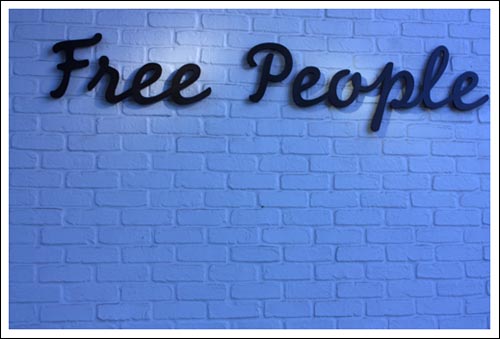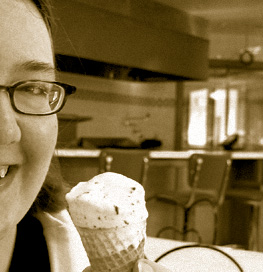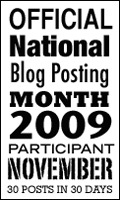poor in the usa

Today is Blog Action Day '08. This year's topic is poverty. The idea is to use your blog to talk about this topic in any way you choose, ideally in a way that fits your audience. It made me think about what it means to be poor in the United States, arguably one of the richest nations in the world. That doesn't mean I am not thinking about the impoverished living outside of the US. Instead I am writing about something I know a bit more about.
pov . er . ty : the state of being extremely poor.
My Mom told stories of growing up poor. The one that hit home the most was when her seven siblings and parents - 9 people - lived in a one-bedroom apartment in Hoboken, New Jersey. It didn't have a bathroom. The toilet was in the hallway, and they shared it with the thirteen people who lived across the hall. Toilet paper was truly a luxury. The "tub" was basically a large sink in the kitchen. Once a week, the women of the family took a bath. On a separate day, the men got the same privilege. They often went to bed hungry. A program at school provided lunch, but required students to present a large pink card, which got them teased. Often my Mom skipped lunch rather than be ridiculed for being poor. Certainly things must be better now over a half a century later?
In a land where it seems there is a television in every room and (at least) two cars in every driveway, who is really poor among us? Are the homeless the only true poor? In a nation where obesity is on the rise, how can there also be a hunger crisis? Who is really poor in America? If you believe what you see on the average sitcom, you would believe no one is poor. Of course that isn't the case, so who is living in poverty in America?
The truth is that the largest group of poor and homeless are children. Of course if you ask people to describe what the homeless population looks like, most often they will talk about the crazy drunk on the street, pushing his shopping cart, collecting bottles to recycle. And while no doubt this is part of the poverty story, it doesn't paint the whole picture.
One way the federal government defines poverty is in terms of household income. In 2008, a family of four was considered living in poverty if they had a household income below $21,200 (this number was slightly higher if the family lived in Alaska or Hawaii).1 That works out to about $1700 per month. Of course that is before taxes, so take home pay is probably closer to $1200 per month. Trying to live on that anywhere in the US would be challenging to say the least, especially given that in many major metropolitan areas the average two-bedroom apartment is within that same range. Again though, this doesn't include everyone.
Recently I heard a piece on NPR about the growing number of homeless families and students as a result of the housing crisis. Many of these people facing homelessness were recent homeowners, so definitely not part of the impoverished in America. The story specifically talked about the impact homeless students have on the public school system. Students are protected by the McKinney-Vento Homeless Assistance Act, which allows students to continue attending the same school before they lost their home. Of course not all families are aware of this law, and not all schools abide by it. Still to a homeless child, the routine of school can offer a sense of normal when the rest of their world is falling apart.
Of course, while not all homeless were poor, not all poor are homeless. Another story on NPR shows how easy it is to fall into poverty when unemployment knocks on your door. In this case a mother caring for six children (three her own, three her sister's) takes matters into her own hands and stands on the street corner in Las Vegas with a sign in an attempt to get their electricity bill paid. She was lucky and within a few minutes a social worker pulls up and by the end of the day her lights were on.
Oftentimes people find themselves in dire straits because one problem sets off a chain of events from which they cannot recover. For example, a family living paycheck to paycheck can't keep up with the rising cost of gasoline, and as a result, bounce a check. That bounced check leads to overdraft charges of a few hundred dollars, which results in not being able to pay the power bill. When the lights are turned off, the food in the fridge goes bad - yet another expense. Furthermore the electric company may require a deposit on top of the late and reconnect fees. Meanwhile, the rent is now due, and the family is several hundred dollars poorer, potentially facing eviction. It really isn't hard to get there, but can feel impossible to get out from under.
After hearing about my mother's childhood, I never felt that we were truly poor, although there were certainly tough times. One of the worst was after we "escaped" from our father. We had left Chico, California in the middle of the night and found ourselves the next morning in Long Beach. My sister, mother and I moved into a small one-bedroom apartment. We had remembered to toss our toys into the backseat of the Ford, but forgot our school shoes. The apartment manager found us a couch and a table and chairs. After my Mom found work, the first thing she bought was a queen-size bed. My sister and I took turns sleeping with my Mom. On alternate nights one of us slept on the floor, until we replaced the couch with a sleeper sofa from Levitz, and then both of us slept in the living room.
Technically were weren't even supposed to be living on that side of the complex, which was designated for single adults. The address was 5050 Linden Avenue. My mother thought it reflected our situation - that we had a fifty-fifty chance of surviving. She didn't know how close that was to the truth until one weekend we managed to take an overnight trip to San Diego. While we were away someone was shot not far from our front door. Thankfully we were able to move shortly thereafter to a better place, but times were still tough.
When my father stopped making child support payments, the system failed miserably because we did not live in the same state. So despite that my father worked for the same company for nearly two decades, it was still impossible for my mother to collect a dime.
On the other hand, when my Mom realized the local public school was merely a baby sitting service - and a bad one at that - she threw herself on the mercy of a nun who ran a local Catholic school. Both my sister and I attended St. Athanasius for two years at a significantly reduced rate.
There is hope. There are things we can do to change this. Education is key. Learning about poverty is the first step to ending it. With this knowledge, vote accordingly.
There are many people out there hurting because of the current state of the US economy. Small steps like cleaning out your closets and donating gently used business attire can make a big difference. With Thanksgiving quickly approaching (in the US), now is a good time to make a donation to your local food bank. Help a friend looking for work with her resume. Invite a family who is struggling to dinner. You get the idea - act instead of judging.
_________________________________________________________
1Source: Federal Register, Volume 73, No. 15, January 23, 2008, pp. 3971-3972.
on the night stand :: How to Be an Explorer of the World: Portable Life Museum
Labels: bad08, blog action day, feeling homeless, homelessness, poor in the US, poverty






1 Comments:
Hey Chris!
Great blog! Impressed how long you've been keeping it! Thanks so much for reading my rant on BlogHer and posting so quickly! I appreciate it. Glad you found me and I'll be by often.
:) Robin
Post a Comment
<< Home